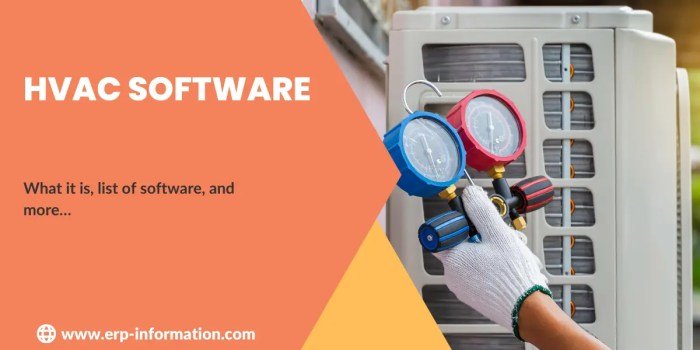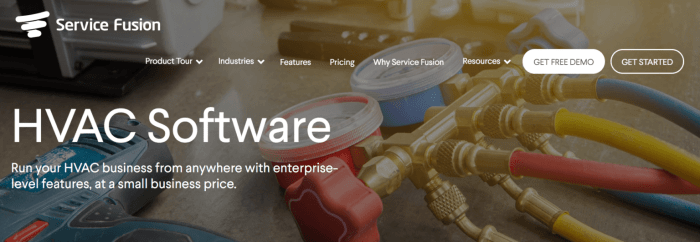In today’s modern homes, HVAC systems play a vital role in maintaining comfort and energy efficiency. To optimize the performance of these systems, residential HVAC software has become an indispensable tool. This guide will delve into the essential features, capabilities, and benefits of the best HVAC software for residential applications, empowering you to make informed decisions about your home’s comfort and energy management.
With the advancement of technology, HVAC software has evolved to provide homeowners with a comprehensive suite of tools to manage their systems effectively. From user-friendly interfaces to advanced data analytics, these software solutions offer a range of features tailored to meet the specific needs of residential HVAC systems.
Software Features and Capabilities
Residential HVAC software is designed to streamline HVAC operations, enhance efficiency, and improve customer satisfaction. The essential features include:
- Job management: Create, schedule, and track HVAC service calls.
- Customer management: Store and manage customer information, including contact details, equipment history, and service records.
- Equipment database: Maintain a comprehensive database of HVAC equipment, including specifications, manuals, and maintenance schedules.
- Scheduling: Optimize technician schedules, minimize travel time, and maximize productivity.
- Invoicing and billing: Generate invoices, process payments, and track financial performance.
- Reporting: Generate reports on key metrics such as technician performance, equipment usage, and customer satisfaction.
Advanced capabilities further enhance user experience and efficiency:
- Mobile access: Access software functionality from smartphones and tablets, enabling remote job management and real-time updates.
- GPS tracking: Track technician location and optimize routing, reducing travel time and improving customer responsiveness.
- Integration with other systems: Connect with accounting software, CRM systems, and other business tools for seamless data sharing.
- Cloud-based access: Store data securely in the cloud, allowing access from any device with an internet connection.
- Artificial intelligence (AI): Utilize AI-powered features for predictive maintenance, automated scheduling, and personalized customer recommendations.
Examples of software with notable features include:
- ServiceTitan: Comprehensive software with a user-friendly interface, mobile access, and advanced features like AI-powered insights.
- FieldEdge: Cloud-based software known for its robust scheduling capabilities, GPS tracking, and integration with other systems.
- HVACBizManager: Software specifically designed for HVAC businesses, offering features like equipment tracking, maintenance reminders, and customer portals.
User Interface and Accessibility
A user-friendly interface is essential for residential HVAC software. Intuitive navigation and clear functionality improve usability, allowing users to quickly and easily access the features they need.
Well-designed user interfaces provide a clear overview of the software’s capabilities, with easy-to-understand menus and icons. Users should be able to navigate through the software without having to consult the user manual.
Examples of Software with Well-Designed User Interfaces
- Carrier ComfortPro: This software features a user-friendly interface with intuitive navigation and clear icons.
- Trane ComfortLink: Trane’s software offers a customizable interface, allowing users to tailor the software to their specific needs.
- Lennox iComfort: This software provides a sleek and modern interface with easy-to-use features.
Compatibility and Integrations
Compatibility with various HVAC systems and devices is crucial for HVAC software to effectively manage and optimize residential systems. It allows seamless integration with existing equipment, ensuring compatibility with thermostats, sensors, and other components. This eliminates the need for additional hardware or software, simplifying installation and reducing compatibility issues.Integrations
with other software, such as project management tools or customer relationship management (CRM) systems, enhance workflow efficiency. By automating data transfer and eliminating manual entry, integrations streamline processes, save time, and reduce errors. Additionally, integrations provide a comprehensive view of project data, allowing for better decision-making and improved customer service.For
example, software like ServiceTitan offers wide compatibility with HVAC systems and integrates with various business management tools, enabling efficient workflow and enhanced customer management. Another example is FieldEdge, which provides seamless integration with QuickBooks and other accounting software, simplifying financial management and reducing manual data entry.
Data Management and Reporting

Data management and reporting capabilities are crucial for effective HVAC system management. HVAC software helps track, analyze, and present data to provide valuable insights into system performance and energy efficiency.
Software with robust data management features allows users to collect and store data from various sources, including sensors, meters, and maintenance logs. This data can be used to create comprehensive reports that provide detailed information on system performance, energy consumption, and maintenance history.
Examples of Software with Data Management and Reporting Features
- ServiceTitan: Provides comprehensive data management capabilities, including customizable reports, performance tracking, and real-time data visualization.
- FieldEdge: Offers advanced reporting tools, allowing users to create custom reports and dashboards to track key performance indicators (KPIs) and identify areas for improvement.
- Smart Service: Features robust data management capabilities, including the ability to track and analyze service history, equipment performance, and customer feedback.
Technical Support and Customer Service

Reliable technical support and customer service are essential for any HVAC software. They ensure that users can get the help they need when they encounter problems or have questions about the software. This can save time and frustration, and it can also help to prevent costly mistakes.
There are several different types of support that HVAC software providers may offer, including:
- Phone support
- Email support
- Online chat support
- Knowledge base
- User forums
The best HVAC software providers will offer a combination of these support options so that users can get the help they need in the way that is most convenient for them.
Exceptional Technical Support and Customer Service
Some of the HVAC software providers that offer exceptional technical support and customer service include:
- Carrier
- Trane
- Lennox
- Goodman
- Rheem
These providers have a proven track record of providing high-quality support to their customers. They have knowledgeable and experienced staff who are available to help users with any problems or questions they may have.
Pricing and Value for Money
When selecting residential HVAC software, it is crucial to consider the pricing models and evaluate the value for money offered by each option. Various pricing models exist, including subscription-based, perpetual licensing, and pay-as-you-go models.To determine the best value for money, it is essential to assess the software’s features, capabilities, and the benefits it provides.
Consider the cost of implementation, ongoing maintenance, and any additional fees associated with the software. Compare the software’s capabilities with your specific needs and requirements.
Competitive Pricing and High Value Propositions
Several software options offer competitive pricing and high value propositions. These include:
-
-*ServiceTitan
A cloud-based software with a subscription-based pricing model, offering a comprehensive suite of features for HVAC businesses.
-*FieldEdge
A mobile-first software with a pay-as-you-go pricing model, providing customizable features and integration options.
-*Smart Service
A cloud-based software with a subscription-based pricing model, featuring advanced scheduling, dispatching, and invoicing capabilities.
Industry Trends and Innovations
The residential HVAC software market is constantly evolving, with new trends and innovations emerging all the time.
These advancements are shaping the future of HVAC management, making it more efficient, effective, and user-friendly.One of the most important trends in residential HVAC software is the increasing use of artificial intelligence (AI). AI-powered software can automate many tasks that were previously done manually, such as scheduling maintenance, diagnosing problems, and optimizing energy usage.
This can save HVAC contractors time and money, and it can also help to improve the quality of service that they provide to their customers.Another important trend is the growing popularity of cloud-based HVAC software. Cloud-based software is hosted on a remote server, which means that HVAC contractors can access it from anywhere with an internet connection.
This makes it easier for contractors to manage their businesses on the go, and it also allows them to collaborate with other team members more easily.Finally, there is a growing trend towards the development of HVAC software that is specifically designed for mobile devices.
This software allows HVAC contractors to manage their businesses from their smartphones or tablets, which gives them even more flexibility and convenience.
Examples of HVAC Software Incorporating Cutting-Edge Technologies and Innovations
-
-*ServiceTitan
This cloud-based HVAC software uses AI to automate many tasks, such as scheduling maintenance, diagnosing problems, and optimizing energy usage.
-*FieldEdge
This mobile-first HVAC software allows contractors to manage their businesses from their smartphones or tablets.
-*CoolCloud
This cloud-based HVAC software uses AI to analyze data from HVAC systems and identify potential problems before they occur.
Final Thoughts
Choosing the right HVAC software for your residential application is crucial to ensure optimal system performance, energy efficiency, and homeowner satisfaction.
By carefully considering the factors Artikeld in this guide, you can select software that aligns with your specific requirements and empowers you to manage your HVAC system with confidence and ease. Remember, investing in high-quality HVAC software is an investment in the comfort, efficiency, and longevity of your home’s heating and cooling system.
FAQ Corner
What are the key features to look for in residential HVAC software?
Essential features include system monitoring, remote access, scheduling, maintenance reminders, energy usage tracking, and compatibility with your specific HVAC equipment.
How does HVAC software improve user experience and efficiency?
Intuitive interfaces, automated alerts, and data analytics capabilities streamline system management, reduce troubleshooting time, and enhance overall user experience.
What are the benefits of compatibility and integrations in HVAC software?
Compatibility with various HVAC systems and integrations with other software, such as home automation systems, allow for seamless communication and centralized control of your home’s comfort and energy management.
How does HVAC software assist with data management and reporting?
Data management features enable tracking, analysis, and visualization of HVAC data, providing insights into system performance, energy consumption, and potential areas for optimization.
Why is technical support and customer service important for HVAC software?
Reliable technical support and customer service ensure that you have access to expert assistance when needed, maximizing the value of your software investment and ensuring peace of mind.